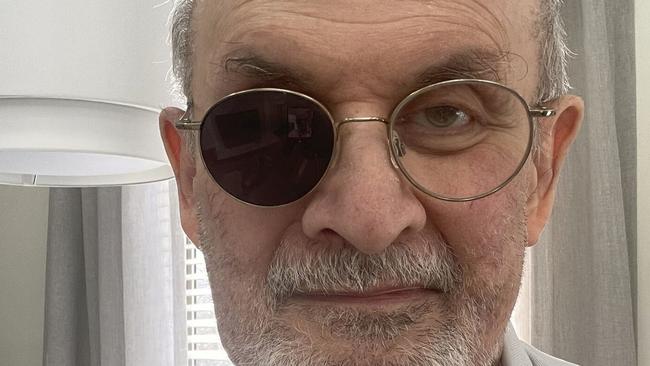Salman Rushdie is blinded but not broken
Salman Rushdie’s latest work offers rewards aplenty for the loyal readers among us.

I remember Salman Rushdie back in the 1980s when he was mainly known as the author of Midnight’s Children, a masterpiece of magical realism to rival Marquez.
This was some years before the Iranian fatwa against The Satanic Verses made him the most famous (and the most endangered) writer on earth. He talked with a Wildean brilliance about literature and life. He talked of the hassles of going to school at Rugby and he showed a boyish awkwardness in the face of his palpable desire for a young woman, who was one of the trio of people who spent endless hours eating and drinking with him, at Melbourne’s Stalactites.
One of the most haunting things he said was how on earth could you write fiction if you were as famous as Norman Mailer and your fame changed the behaviour of anyone when you walked into a bar.
He also said he wanted to write a book about Islam that was not just a secular sneer. The Satanic Verses was interpreted as the biggest secular sneer on earth because it was thought to impugn the prophet Mohammed.
The Ayatollah Khomeini of Iran called for Rushdie to be killed. I found myself writing a long, full-dress defence citing the Koran and found myself being shouted at by an Iranian zealot as I spoke in Rushdie’s defence at a Melbourne University forum.
But Rushdie was always a stirrer, always a drama queen: Indira Gandhi, no less, took him to court for the portrait of her as the ball-snipping Widow of Midnight’s Children. The dictator General Zia-ul-Haq had a special needs daughter and her fictional counterpart in Shame was one who turned into an avenging Beast.

It’s sad and terrible that Rushdie’s new book, Victory City, should come out only a few months after he was blinded in one eye by a crazed assailant in Chautauqua, upstate New York, who seems to have been inspired by the fatwa to attempt murder. Rushdie had previously enjoyed years of unthreatened serenity in America. This book was completed before he was attacked. It’s a mystery why Penguin Random House – who had the book printed by Griffin Press in Australia – should not have released it on February 9, the London and New York release date.
Rushdie’s fiction has been up and down since he depended for his life on Special Branch but he remains one of the most remarkable writers to hit the world of literature in my lifetime. Any lover of fiction and truth who buys this collection of tall but co-ordinated stories as an act of loyalty will discover that it has its own rewards.
With Victory City, Rushdie has taken as his subject some fabulated version of Indian history in the 15th and 16th centuries. The upshot has a ravishing narrative grace even though it is full of jerks and truncated climaxes that violate every law of fictional probability.
Well, Rushdie is a magical realist and that comes with a licence to fiddle the abracadabra as the fancy takes. For what it’s worth, his brief acknowledgments at the end cite works like Noboro Karashima’s Towards a New Formation: South Indian Society under Vijayanagar Rule, along with VS Naipaul’s India: A Wounded Civilisation.
The main character is one Pampa Kampana who sees her goddess mother burnt before her eyes and who becomes the founding intelligence, the great procreative dreamer of a city called Bisnaga which means “victory city”.
From the very first seeds of things she creates the brothers who become the first king and then the crown prince and second king of a place that takes on human population in motion animated by some principle of dreaming.
If there is a difficulty with Victory City it’s that it’s one of those books where anything can happen so that you sometimes have doubts as to why anything in particular does. Pampa Kampana is telling the great story and we constantly feel the implicit presence of doors opening and shutting without rhyme or reason, although this does function as a kind of animated homage to the crazy arbitrariness of history.
But Pampa Kampana who is more than 100 years old – though she looks 30 – escapes at one point with her daughters in the guise of a bird and one of her young descendants who is half-Chinese comes to be a titular queen of Bisnaga – the top queen and her mother are poison experts – and Pampa Kampana gets very intensely involved with a blue-skinned king who fancies himself as an avatar of the Lord Krishna.
There’s God’s plenty of competing religious visions in this book as Rushdie delineates the multiplicity of Hindu deities, the Muslim emphasis on the one true God and the stark and grand simplicities of Buddhism. It’s a fabulously rich mix and Rushdie has put masses of his sumptuous and dexterous art into simulating a kind of rival Ramayana with poetry-speaking elephants and all manner of atrocities and cynicisms and parodies of the randomness of history.
Victory City has an enthralling enchantment which is consistently dumbfounding in the way it defeats every principle of narrative expectation including the most basic ones. Does it show that the inbuilt trashiness which is part of the licence this kind of fiction-making – postmodernism rules, OK?– allows itself, can sometimes be too much? Maybe, but it’s also true that Victory City consistently pastiches the twists and turns of a romance chronicle from a period much older than fictional realism. (Think of the Morte d’Arthur.)
It’s not a book you’re sorry to finish but it’s full of fabulous beasts and crimes and spiritual illuminations and it is all protected by way of being an epic poem of Pampa Kampana herself.
She is her own muse and the music she makes from the history she upends is striking in its golden quality, its ghastliness and its strangeness.
By the way, the Audible version read by Sid Sagar is lucid but a bit flat-sounding. It lacks that lilting quality you hear in Rushdie’s voice or in the actor Art Malik (who recorded The Moor’s Last Sigh) where you don’t hear an Indian accent but the undertone of an Indian timbre, a bit like the Welsh element in the voice of Anthony Hopkins or Richard Burton.
Salman Rushdie took on the world, and he has been mutilated as a consequence. As a writer and as a man, he has shown tremendous courage. Now is the time to honour him.
Peter Craven is a cultural critic.
Victory City



To join the conversation, please log in. Don't have an account? Register
Join the conversation, you are commenting as Logout